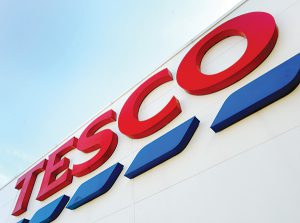It’s hard to accept that Tesco Plc boss Ken Murphy deserves the full £3.2 million ($3.9 million) top-up he received in addition to his £1.5 million fixed pay for its last financial year. The award points to a badly designed bonus plan which can pay jumbo rewards on very crude metrics.
The one good thing about Murphy’s bonus is that the UK grocer lays out transparently how it was calculated. He was entitled to a maximum of £3.4 million pounds, calculated as 2.5 times his base salary. A big portion of this was tied to Tesco’s sales number. If this grew about 3%, to exceed £54 billion, it would contribute just over £1 million to the payout. That box was ticked.
An even bigger slug was tied to Tesco’s underlying operating profit. If this crossed £2.5 billion — essentially regaining its pre-pandemic level — it would swell the bonus by £1.6 million pounds. Again, box ticked.
Surprisingly, just one-fifth of the potential award was tied to Murphy’s “individual†performance as assessed by the board’s remuneration committee. And here, the box was only partially ticked. He scored 75%, earning him just over £500,000. One of the measures he did less well on was delivering on ESG commitments. Yet Murphy earned a sizeable bonus anyway. If individual performance played a greater role in determining the payout, the outcome would have been different.
Clearly it would be unfair to say the chief executive made no difference to Tesco’s last financial results. This is Britain’s biggest supermarket. It has helped keep the nation fed even while facing staffing and sourcing challenges. Running all this is a very tough job. But arguably the company’s ability to generate sales and profit growth at this time was influenced by some significant factors outside Murphy’s control. Revenue from Booker, Tesco’s wholesale division, bounced back as restaurants began trading again. The return of travel boosted petrol sales.
It’s easy to overstate the impact of leaders on a business. There are some skillful operators, and sometimes a boss can pursue a visionary takeover or make a shrewd decision that shifts the strategy in a clever direction. But Murphy started the job only in October 2020. Broader economic factors and decisions by his predecessors weigh strongly here. The business performance was a collective heave by its thousands of staff.
Of course, the problem appears to be with a crude bonus formula. But when the math crunches out a number that conflicts with common sense, the latter should prevail.
For its part, Tesco said it was satisfied that the formulaic outcomes reflected performance.
Politically, it’s a terrible look for Tesco when the cost-of-living crisis and the increasing price of food loom large on the public agenda. Tesco Chair John Allan has himself been vocal in warning about the rise of food poverty. The company has admittedly given its in-store staff a 6% pay rise, and doubtless Murphy could earn a lot more in the US, or in private equity. Only half his bonus gets paid upfront. The fact remains that Britain’s biggest retailer is asking for trouble when the boss is doing so much better than his workers and customers.
—Bloomberg
 The Gulf Time Newspaper One of the finest business newspapers in the UAE brought to you by our professional writers and editors.
The Gulf Time Newspaper One of the finest business newspapers in the UAE brought to you by our professional writers and editors.
